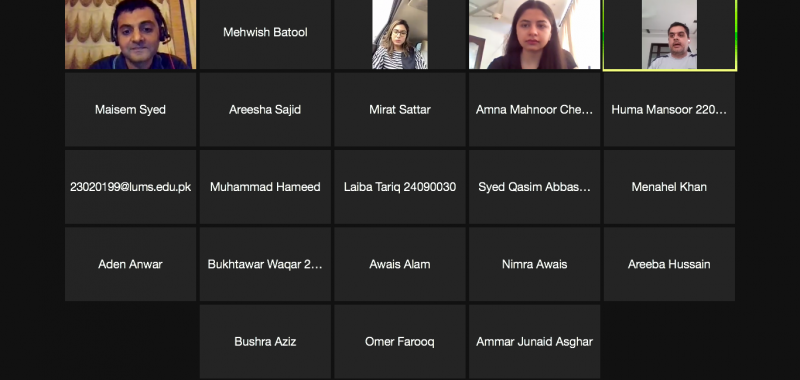
The Center for Chinese Legal Studies at LUMS officially commenced its four-week Virtual Internship Programme on 18th May, 2021. An Orientation was held online on Zoom for the selected interns to apprise them of the activities held at the Center and introduce them to the collaborative research work that they will soon be a part of.
Eeman S. Qureshi, Assistant Manager of CCLS, welcomed 17 interns and congratulated them on their selection out of a total of 100 applicants. Minahil Toor, Research Associate, was also pleased to welcome a talented group of students from diverse backgrounds who will be joining the think-tank to supplement the research work.
Director of the CCLS and one of the founding members of SAHSOL, Professor Sikander A. Shah, and the Head of Department of Law School, Professor Uzair Kayani, gave their introductory remarks and enlightened them of the Center’s visions and objectives.
Professor Shah focused on the interdisciplinary vision of the Center and the changing regional dynamics propelled by the rising influence of China. The groundbreaking CPEC and the greater Belt and Road Initiative have far-reaching implications for Pakistan in terms of development, infrastructure, politics, social reform, and human rights. China’s poverty-alleviation programmes are exemplary and its multipronged projects have also sparked regional connectivity. Hence, the Center espouses similar ideals of conducting multidisciplinary and collaborative academic research with different countries, centers, embassies, and universities. He also expressed the sense of responsibility of citizens and academics to carry out this research work in collaboration with the governments and the civil society for a more sustainable future.
Professor Kayani further discussed the bipolarity of world politics and the change taking place at the international, comparative, and domestic politics level owing to the rising power of China. His primary focus was the Center’s collaboration with the Law School. The diverse political, legal, and philosophical aspects of Pak-China collaboration are underexplored and the Center aims to leverage its connectivity and resources to explore the key areas of capacity building and research. Interns were encouraged to harness this opportunity and learn from the engagements that will take place as part of the Center’s collaborative work.
After the introductory remarks, the interns were requested to give brief introductions and their expectations of the Center. They were also introduced to the nature of the work which would include highlighting the existing gaps, applying for research grants, preparing budget proposals, writing op-eds, and suggesting effective marketing strategies. Lastly, interns were notified of the upcoming lecture series by renowned experts on CPEC and BRI projects which would add to their learning experience.








